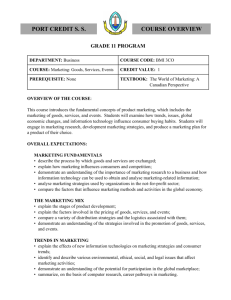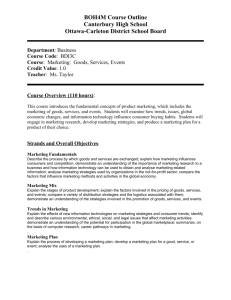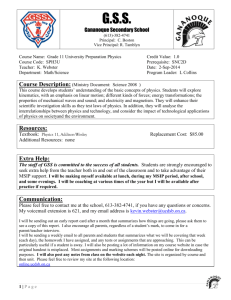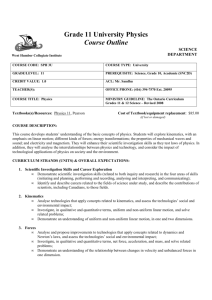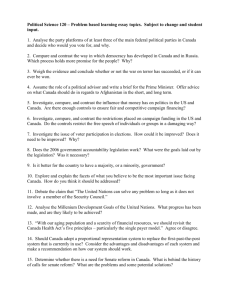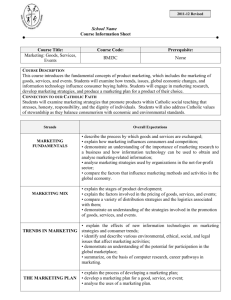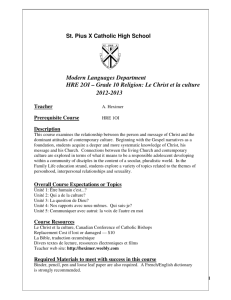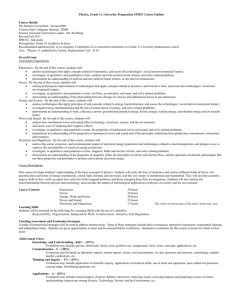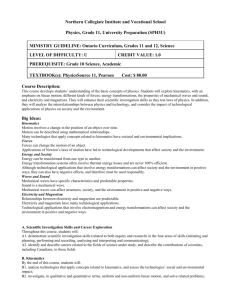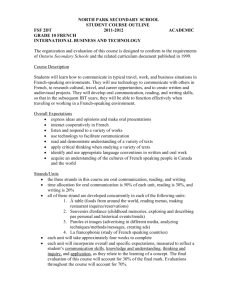St. Pius X High School Grade 11 University Physics
advertisement
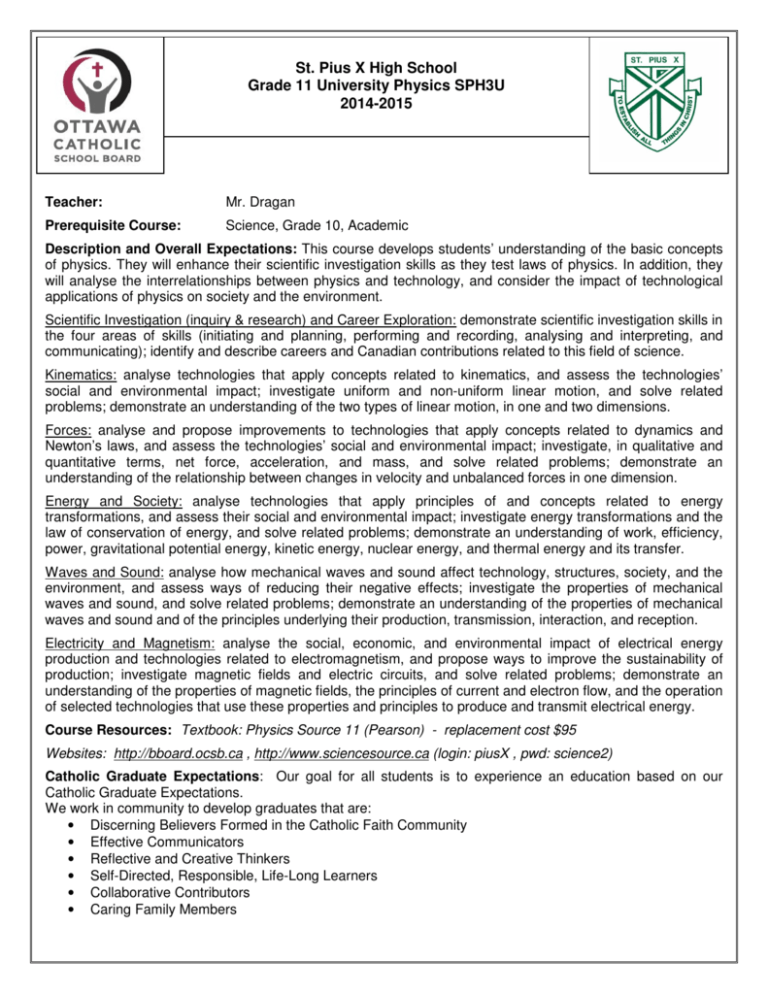
St. Pius X High School Grade 11 University Physics SPH3U 2014-2015 Teacher: Mr. Dragan Prerequisite Course: Science, Grade 10, Academic Description and Overall Expectations: This course develops students’ understanding of the basic concepts of physics. They will enhance their scientific investigation skills as they test laws of physics. In addition, they will analyse the interrelationships between physics and technology, and consider the impact of technological applications of physics on society and the environment. Scientific Investigation (inquiry & research) and Career Exploration: demonstrate scientific investigation skills in the four areas of skills (initiating and planning, performing and recording, analysing and interpreting, and communicating); identify and describe careers and Canadian contributions related to this field of science. Kinematics: analyse technologies that apply concepts related to kinematics, and assess the technologies’ social and environmental impact; investigate uniform and non-uniform linear motion, and solve related problems; demonstrate an understanding of the two types of linear motion, in one and two dimensions. Forces: analyse and propose improvements to technologies that apply concepts related to dynamics and Newton’s laws, and assess the technologies’ social and environmental impact; investigate, in qualitative and quantitative terms, net force, acceleration, and mass, and solve related problems; demonstrate an understanding of the relationship between changes in velocity and unbalanced forces in one dimension. Energy and Society: analyse technologies that apply principles of and concepts related to energy transformations, and assess their social and environmental impact; investigate energy transformations and the law of conservation of energy, and solve related problems; demonstrate an understanding of work, efficiency, power, gravitational potential energy, kinetic energy, nuclear energy, and thermal energy and its transfer. Waves and Sound: analyse how mechanical waves and sound affect technology, structures, society, and the environment, and assess ways of reducing their negative effects; investigate the properties of mechanical waves and sound, and solve related problems; demonstrate an understanding of the properties of mechanical waves and sound and of the principles underlying their production, transmission, interaction, and reception. Electricity and Magnetism: analyse the social, economic, and environmental impact of electrical energy production and technologies related to electromagnetism, and propose ways to improve the sustainability of production; investigate magnetic fields and electric circuits, and solve related problems; demonstrate an understanding of the properties of magnetic fields, the principles of current and electron flow, and the operation of selected technologies that use these properties and principles to produce and transmit electrical energy. Course Resources: Textbook: Physics Source 11 (Pearson) - replacement cost $95 Websites: http://bboard.ocsb.ca , http://www.sciencesource.ca (login: piusX , pwd: science2) Catholic Graduate Expectations: Our goal for all students is to experience an education based on our Catholic Graduate Expectations. We work in community to develop graduates that are: • Discerning Believers Formed in the Catholic Faith Community • Effective Communicators • Reflective and Creative Thinkers • Self-Directed, Responsible, Life-Long Learners • Collaborative Contributors • Caring Family Members • Responsible Citizens http://www.iceont.ca Assessment, Evaluation and Reporting: The primary purpose of assessment and evaluation is to improve student learning. Students will understand what is expected of them, using learning goals, and success criteria, based on the overall expectations. Feedback (self, peer, teacher) supports learning, and plays a critical role in academic achievement and success. The development of learning skills and work habits is a key indicator of future success. The following learning skills and work habits will be developed, assessed, and reported during this course: 1. Responsibility fulfills responsibilities and commitments (e.g. accepts and acts on feedback) 2. Organization manages time to complete tasks and achieve goals (e.g. meets goals, on time) 3. Independent work uses class time appropriately to complete tasks (e.g. monitors own learning) 4. Collaboration works with others, promotes critical thinking (e.g. provides feedback to peers) 5. Initiative demonstrates curiosity and an interest in learning (e.g. sets high goals) 6. Self-Regulation sets goals, monitors progress towards achieving goals (e.g. sets, reflects goals) Group work supports collaboration, an important 21st century skill. This will be assessed only as a learning skill. Homework may also be assessed as a learning skill. Evaluation completed in class will be based only on individual student work. Regular attendance is important to support group work, various forms of feedback, and to allow students to demonstrate evidence of their learning. Students are responsible for providing evidence of their own learning (with references where required), in class, within given timelines. Next steps in response to academic integrity issues, such as lack of work completion, plagiarism, or other forms of cheating, range from providing alternate opportunities, to a deduction of marks. The achievement chart identifies four levels, based on achievement of the overall expectations: Level 1 achievement falls below the provincial standard (50-59%) Level 2 achievement approaches the provincial standard (60-69%) Level 3 achievement is at the provincial standard (70-79%) Level 4 achievement surpasses the provincial standard (80-100%) The report card grade will be based on evidence of student performance, including observations, conversations and student products. Consideration will be given to more recent evidence (skill development) and the most consistent level of achievement. Mark Breakdown: Term Work (70%) will include a variety of assessment tasks designed to demonstrate students’ development in their knowledge and understanding, thinking and inquiry, communication and application, of all overall expectations. Summative evaluation (30%) takes place towards the end of the semester, is completed in class, and provides the final opportunity for students to demonstrate what they know, and the skills they have learned, based on the overall expectations. In physics 3U, the summative evaluation will consist of a rich summative assessment task (5%) and a final exam (25%). Awarding of Course Credit: Students who demonstrate evidence of achievement of overall expectations, and earn a mark of 50% or greater, will earn one credit for the course with the following exception: Students who do not complete their summative evaluation (exam and/or end of year summative task) will not earn their credit regardless of their mark. Student and Parent/Guardian Acknowledgement We have read the above course outline and are aware of the student responsibilities to attend class on a regular basis and to provide evidence of learning within the established timelines. Student's Name (print): _______________________ Student's Signature: ____________________________ Parent/Guardian Name (print):_________________Parent/Guardian Signature: ________________________
